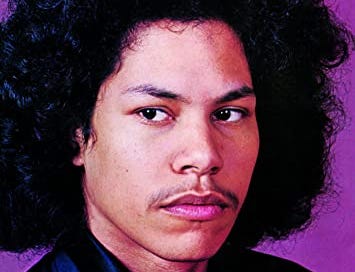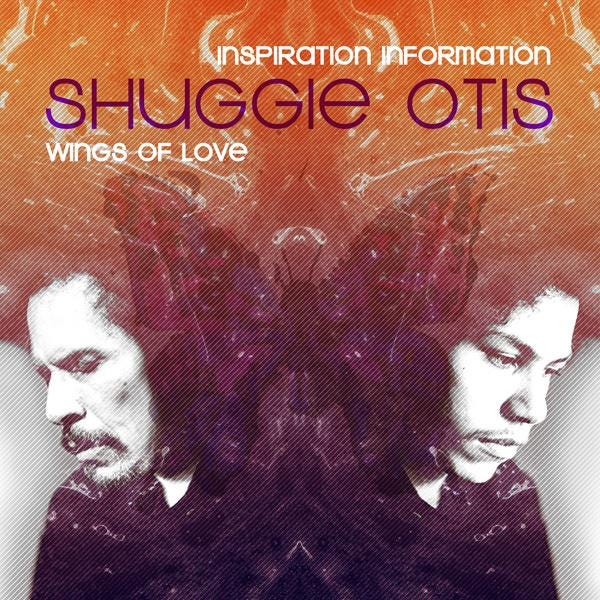“Strawberry Letter #23” by SHUGGIE OTIS
Before "Raspberry Beret," there was this candy-colored psychedelic soul by the teenaged son of an R&B impresario.
Is it cool?
Johnny Otis said that he first passed for black to get into a “colored only” Count Basie concert in San Francisco. It was at that show when the son of Greek immigrant grocers1, so impressed by drummer Jo Johnson, decided to get serious about music. Otis had a long career as a musician, bandleader, producer, A&R talent scout, disc jockey, and recording artist. He had a hit in 1958 with “Willie and the Hand Jive,” but he’s one of those people who keeps popping up in the history of R&B and early rock ‘n’ roll —scoring a big band hit with “Harlem Nocturne,” producing and co-writing Big Mama Thornton’s original “Hound Dog,” playing vibraphone on Johnny Ace’s “Pledging My Love,” discovering Etta James and Jackie Wilson. His oldest son, Johnny Alexander Veliotes, Jr., who was given the nickname Shuggie by his mother, started doing club gigs with him at age 11.
Shuggie Otis’s exposure to music came from his father’s band rehearsing weekends in the family home. After absorbing all that blues and R&B, he wore dark glasses and a painted-on mustache to play grubby club gigs with the band as a tween guitarist. Before long, the late ‘60s happened, and Shuggie was in the gravitational pull of Jimmy Hendrix and Sly and the Family Stone. In 1969, the then 15-year-old was recruited by Al Kooper2 to be a featured guest on his Kooper Session album, which was recorded in a weekend, and played bass on Frank Zappa’s landmark jazz-fusion instrumental “Peaches En Regalia.” His first album, Here Comes Shuggie Otis, with many songs co-written with his father, came out the same year. On “Shuggie’s Boogie,” he recounts those early days with his father’s band and casually demonstrates the chops he honed in those days, playing in the styles of B.B. King, T-Bone Walker, Son House, and Elmore James.
“Strawberry Letter #23” comes from Shuggie’s second album, 1971’s Freedom Flight. His playing is still rooted in the blues, but true to its title, the album is a departure. He was, after all, 18 years old at the time. Shuggie plays most of it himself, with a few notable guests like keyboardist George Duke3. For every blues jam like the cosmic “Purple,” there are airy songs like “Someone’s Always Singing,” which echoes the record’s theme of escape: “If I want to fly away or if I want to stay / I just want to be myself and live from day to day.” The title song is a 13-minute fusion odyssey, but the words “Freedom Flight” are also in “Strawberry Letter #23.”
If you arrive and don't see me
I'm going to be with my baby
I am free, flying in her arms
Over the sea
Stained window, yellow candy screen
See speakers of kite
With velvet roses diggin'
Freedom flight
It’s a sweet love song, with Shuggie strumming an acoustic guitar while Duke adds the track’s trademark tinkling celesta4. Its synesthesia-fueled lyrics are more childlike than psychedelic: “Blue flowers echo / From a cherry cloud.” (If that kind of refrigerator poetry from an artist who played most of the parts on a record himself sounds like Prince, he was indeed a Shuggie fan. It’s an easy line to draw from “Strawberry Letter #23” to songs like “Raspberry Beret.”) Freedom Flight and “Strawberry Letter #23” both skimmed the pop charts in 1971. The second half of the four-minute song is a pretty guitar solo that spirals like swallows in flight; as guitar-hero solos go, it’s more heartwarming than face-melting.
Shuggie’s followup, Inspiration Information, took three years to produce. He wrote and arranged all the songs himself and played every instrument, except for some horns and strings. The title song, a lovely bit of psychedelic soul, had a brief dip into the pop charts but didn’t do enough for his label, Epic Records, who’d wearied of Shuggie “taking his time” to make a record. In the record’s wake, Shuggie turned down an offer to tour with the Rolling Stones (made via Billy Preston). He also turned down Quincy Jones’ offer to produce his next record, which was enough for Epic to nullify his contract.
What Jones could have done with a Shuggie Otis song came to fruition with his production of the Brothers Johnson 1977 cover of “Strawberry Letter #23,” which keeps the celesta and spiraling solo (played by session ace Lee Ritenour), but adds a ton more groove. The sound is sophisticated and slinky. Where Shuggie’s original is a sunlit playground, the cover is cast in the glow of a nightclub table lamp. The song was a #1 R&B hit and rose to #5 on Billboard’s Hot 100. It’s great, just in a wholly different way.
Johnny Otis was inducted to the Rock & Roll Hall of Fame in 1994 with the Ahmet Ertegun Award, which goes to “non-performing industry professionals who, through their dedicated belief and support of artists and their music, have had a major influence on the creative development and growth of rock & roll and music that has impacted youth culture.” That’s one of the least rock ‘n’ roll sentences ever written and disregards the elder Otis’s long career as a musician, but no matter, Johnny was happy with it. In her induction speech, Etta James said “when it comes to R&B and jazz, he’s sure enough a guru.”
“Inspiration Information” meanwhile became a rare-groove favorite in the ‘90s, eliciting head nods from hip-hop to the acid jazz scene. The album was re-released on David Byrne’s Luaka Bop label in 2001. Byrne is sure enough a guru when it comes to eccentric geniuses, which could explain why now, that’s how your average music scene type sees Shuggie. Maybe he was ahead of his time. Or maybe he spent his childhood developing phenomenal musical skills, sometimes on stage with grown men hiding his true age; as an adult, what better use for those skills than to touch the sky? The music you make — or don’t — sounds like freedom.
18 Song Playlist
Songs by and featuring Shuggie Otis and/or Johnny Otis, plus other songs mentioned in or in the direction of this post.
Thank You
Thanks for reading. If you’d like to further support this project, please share with 3 - 4 friends who might appreciate it.
"As a kid I decided that if our society dictated that one had to be black or white, I would be black." — Johnny Otis, Listen to the Lambs
Most famous for playing Hammond organ on Bob Dylan’s “Like a Rolling Stone” and forming Blood, Sweat & Tears and bailing before they got big.
This song is dope
Like a glockenspiel but with a mellower tone







“Jimmy” Hendrix???